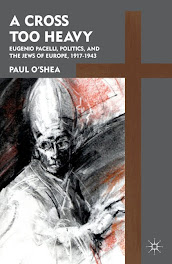ADSS 1.4 Filippo Cortesi (1), Poland to Luigi Maglione,
Secretary of State.
Reference:
Report number 202, (AES 1528/39)
Location
and date: Warsaw, 18.03.1939
Summary
statement: German-Polish tension; German note on their claims in Poland and
Polish reply.
Language:
Italian
Text:
Warsaw,
and with it the entire nation, lives through days of great anxiety and earnest
patriotism, following the uncertain and vague news of grave international
events appearing in the Press and watching the extraordinary measures taken by
the Government and the movement of the troops at the frontier.
The
Government has not yet issued any official statement to the Press on the
situation; but the fact that Parliament has been adjourned for 30 days and the
various appeals to the country, inviting the people to stand together in
disciplined calm, are signs that a serious danger threatens the nations.
I
have been informed that the Government has today given in confidence to the
principal Press representatives the following news which I hasten to send to
your Eminence.
The
Reich has sent to the Polish Government a Note (2) with the following demands:
1.
Annexation of Danzig to the Reich, including the port of Westerplatte, the
railway and other properties of the Polish Government included in the area of
the Free Port.
2.
Transfer of a strip of territory through Pomerania from Chojnice (German: Konitz) to Tczew (German: Dirschau), which links West
Prussia with East Prussia.
3.
German participation in the main Polish steel plants in Silesia.
The
Government replied: Poland observes the Non-aggression Pact of 1934. And being invited almost in the form of an
ultimatum to clarify its position replied: Poland has no claim whatsoever on
German Territory.
After
this the Reich requested permission to send a military aircraft to Warsaw to
remain at the disposal of the German Ambassador; the Government’s immediate
reply was that as many as five aeroplanes could be sent.
It
is to be noted that this bandying of words has taken place orally or by notes,
between the German Ambassador and the Polish Under-Secretary for Foreign
Affairs, although Minister Beck was in office in Warsaw. (3)
A
state of tension, therefore, exists between the Reich and Poland, which could have
the most serious consequences.
Undoubtedly, both Government and people are ready to defend the
integrity, the rights and the liberty of Poland at any cost, and to stand fast
in this resolve and to trust only in their own strength. The proof of this is the enthusiasm with
which people from every walk of life have accepted and willingly subscribe to a
great national loan.
In
political and diplomatic circles there is the feeling that in case of armed
conflict Poland, who has received in the last few days a big loan from Great
Britain to assist the manufacturing industries, could count on the help of the
Western Powers. It is also believed that
Italy, long standing friend of Poland, will exert its influence to avoid an
armed conflict between Germany and Poland.
Notes:
(1)
Archbishop Filippo Cortesi (1876-1947) Nuncio to Poland 1936-47.
(2)
DGFP, D, VI, no. 61, pp 58-60 – Ribbentrop’s note of 21.03.1939 in which he
claimed Danzig and a motorway link with East Prussia.
(3)
Hans-Adolf von Moltke (1884-1943), German Ambassador to Poland 1931-39; Jan
Szembek (1881-1945), Polish Under-Secretary of State for Foreign Affairs
1932-39; Jozef Beck (1894-1944), Polish Foreign Minister 1932-39.




No comments:
Post a Comment
You are welcome to post a comment. Please be respectful and address the issues, not the person. Comments are subject to moderation.